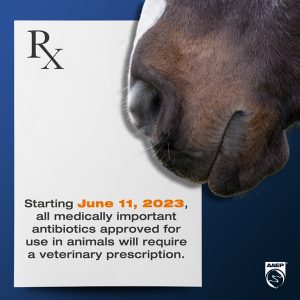OTC Sale of Livestock Antibiotics Ends June 11, 2023
Beginning on June 11, 2023, over-the-counter antibiotics will no longer be available through traditional retail channels. Instead, these antibiotics will require a prescription from a veterinarian licensed in the state where the animals are housed.
Why is this happening?
To ensure continued effective antibiotic use in humans and animals, the U.S. Food and Drug Administration Center for Veterinary Medicine developed a 5-year Veterinary Stewardship Plan to slow the emergence of antimicrobial resistance from the misuse of antibiotics in animals while ensuring the safe and effective use of medical antibiotics in animals and humans. Many antibiotics are crucial to human and animal health. This legislation ensures that these drugs are used under veterinary supervision, reducing antimicrobial resistance to these drugs in humans and animals. This new rule concerns the few antibiotics that remain available over the counter in the form of injectables, intramammary tubes and boluses.
What does this mean to you?
You will no longer be able to purchase antibiotics from a farm store, mail order, or route driver unless you have a prescription from your veterinarian. Prescriptions must be filled by a pharmacist, but it is unlikely that local Wilco, Coastal or Tractor Supply stores will hire a pharmacist to fill veterinary prescriptions. You will be able to purchase these antibiotics from your veterinarian, or you can use a veterinarian’s prescription to buy from an online vendor. Some local pharmacies will likely carry more veterinary-labeled products. Work with your veterinarian to adjust how your farm will access animal health products. This legislation also applies to nonfood animal species like dogs, cats, camelids and horses.
Which antibiotics will be affected?
Prescription-only items will include injectable tylosin (Tylan injectable and water soluble), injectable and intramammary penicillin (Albadry), injectable and oral oxytetracycline (Liquimycin LA-200, Noromycin 300 LA, Oxytetracycline HCl soluble powder), sulfadimethoxine and sulfamethazine (Albon, Sustain III bolus), gentamicin (Gentamicin sulfate injectable), cephapirin and cephapirin benzathine intramammary tubes (Today, Tomorrow). Most other products — including dewormers, fly preventatives, vaccines and coccidiostats — will not be impacted by these changes.
How will I obtain antibiotics after June 2023?
To obtain these drugs, producers will need a valid veterinarian-client-patient relationship (VCPR) with a licensed veterinarian. A VCPR is considered valid if all of the following apply:
- A veterinarian has assumed the responsibility for making medical judgments regarding the health of an animal and the need for medical treatment.
- The animal owner or caretaker has agreed to follow the instructions of the veterinarian.
- The veterinarian has sufficient knowledge of the animal to initiate at least a general or preliminary diagnosis of the medical condition of the animal.
- The practicing veterinarian is readily available for follow-up in case of adverse reactions or failure of the therapy regimen.
- The veterinarian has recently seen and is personally acquainted with the keeping and care of the animal by virtue of examination of the animal, and/or by medically appropriate and timely visits to the premises where the animal is kept. In Oregon, this means that a veterinarian has visited or seen your operation or animals within the past 12 months.
- The veterinarian is not required to examine every animal to be treated but has sufficient knowledge of your specific situation to initiate and prescribe treatment.
Should I just stock up on antibiotic supplies?
No! Now is not the time to stock up on over-the-counter products to avoid needing a prescription. Animal products have expiration dates and are sensitive to storage time and conditions. Purchasing products now may result in those products expiring, resulting in the wastage of products and money.
What if I don’t have a veterinarian?
If you do not already have a VCPR and need to find a veterinarian who offers services to livestock owners here are some resources that may help you:
- For cattle veterinarians, search the American Association of Bovine Practitioners.
- For sheep, goat and camelid practitioners, search the American Association of Small Ruminant Practitioners.
- For equine practitioners, search the American Association of Equine Practitioners.
For additional information or questions, contact Charles T. Estill, VMD, PhD, Diplomate American College of Theriogenologists, Extension Veterinarian, Oregon State University.











